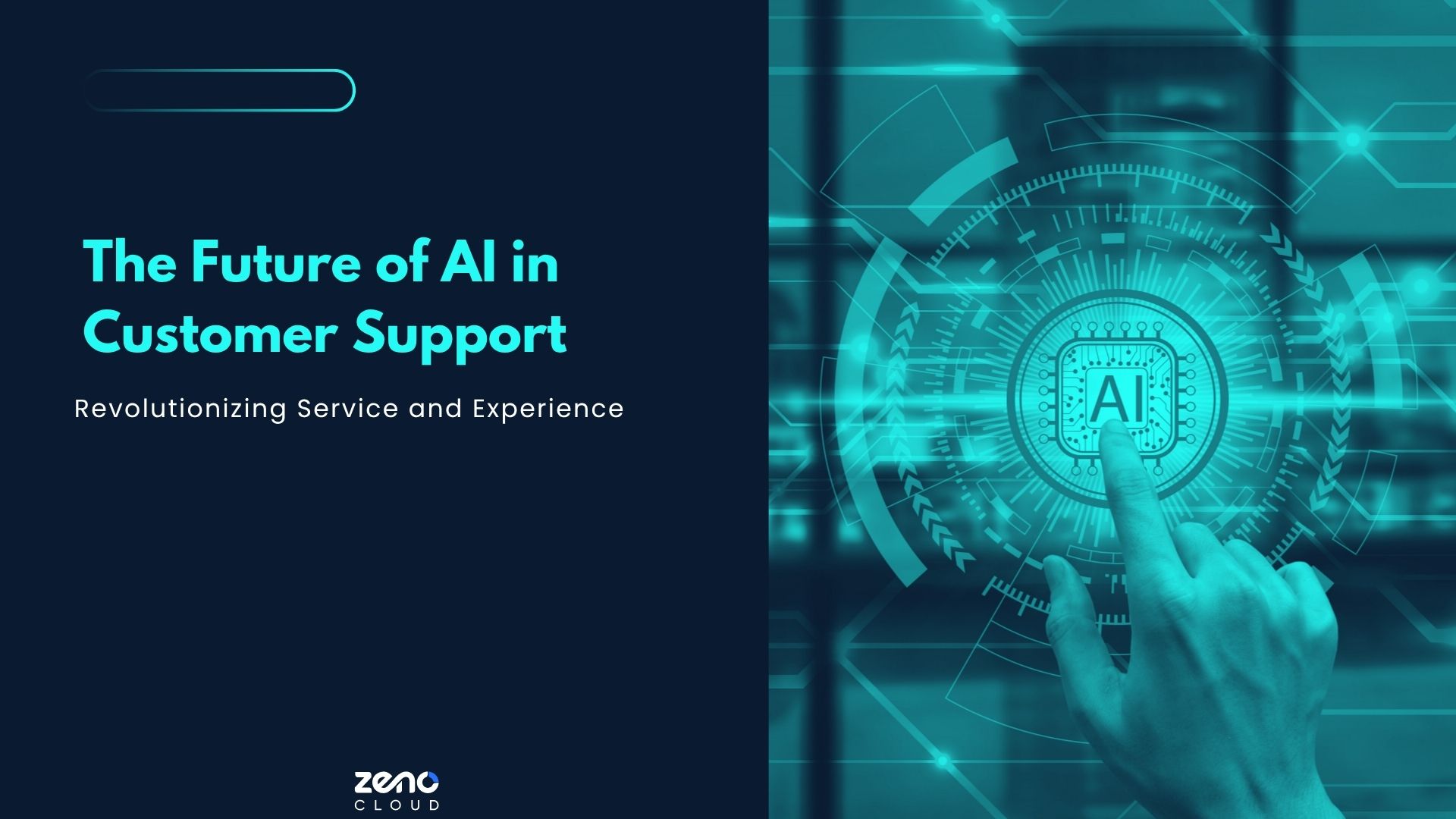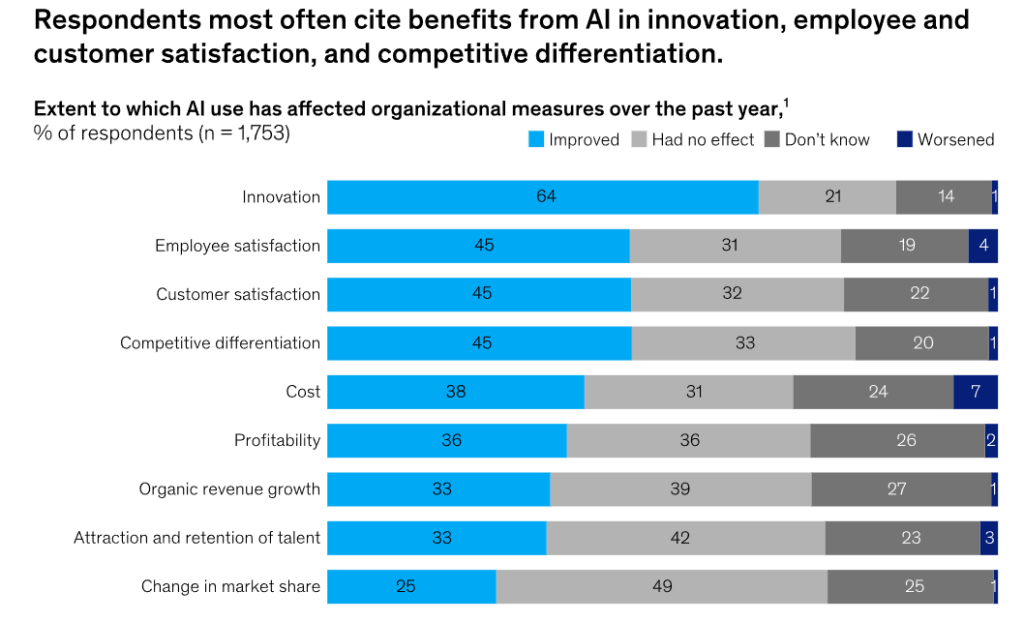
The customer support landscape has seen rapid advancements in recent years, with artificial intelligence (AI) leading the charge in transforming how businesses interact with their customers. Gone are the days of long wait times and limited availability; AI is reshaping customer service into a seamless, 24/7 experience that enhances both efficiency and satisfaction.
In this blog, we’ll explore the key ways AI is revolutionizing customer support, what the future holds, and how businesses can leverage AI to deliver exceptional service to their customers. Before we proceed, let’s unlock some interesting stats about how respondents have gained benefits from AI in tech innovation and customer satisfaction.
AI as a catalyst for innovation
According to the research by McKinsey , current data shows that while artificial intelligence is making gradual progress within organizations, its direct financial impact remains limited. Only about 39% of respondents link AI to any measurable effect on enterprise EBIT, and even among them, most attribute less than 5% of total EBIT to AI initiatives.

However, the real transformation appears beyond the balance sheet. A significant portion of respondents report that AI adoption has enhanced their organization’s ability to innovate. Nearly half also note improvements in customer satisfaction and stronger market differentiation—suggesting that AI’s greatest value today lies in driving creativity, efficiency, and customer-centric growth rather than immediate profit gains.
1. AI-Powered Chatbots: The First Line of Support

AI-powered chatbots have already become a staple in customer support, providing businesses with a reliable first line of assistance. These bots are programmed to handle simple queries, perform routine tasks, and even guide customers through troubleshooting processes.
Why It Works:
- Instant Response: Chatbots can provide immediate answers to frequently asked questions, reducing the need for customers to wait for a human agent.
- 24/7 Availability: AI chatbots are always online, ensuring that customers can get support at any time, even outside business hours.
- Cost Efficiency: By handling repetitive and simple tasks, chatbots free up human agents to focus on more complex issues, reducing operational costs.
As chatbots continue to improve, they will be able to engage in more natural and context-aware conversations, making them even more effective in customer support scenarios.
2. Personalization with AI: Understanding Customer Needs
AI is helping businesses create personalized customer experiences in ways that were previously unimaginable. By analyzing customer data, AI systems can offer tailored responses, suggestions, and solutions based on individual preferences and past interactions.
Why It Works:
- Behavioral Insights: AI can analyze previous interactions, browsing history, and purchase patterns to anticipate customer needs and deliver highly relevant suggestions.
- Proactive Support: Rather than waiting for customers to report issues, AI can predict potential problems and address them before they escalate, enhancing the customer experience.
This shift towards personalized support ensures customers feel valued, fostering stronger relationships and increased loyalty.
3. AI for Sentiment Analysis: Understanding Customer Emotions
Sentiment analysis tools powered by AI are becoming crucial in customer support, helping businesses gauge the emotional tone of customer inquiries. This allows support teams to better understand how customers feel and respond accordingly, ensuring that customers receive the appropriate level of empathy and attention.
Why It Works:
- Real-Time Emotional Insights: AI can analyze the tone and context of customer messages, detecting frustration, satisfaction, or confusion, and routing inquiries to the right agent or escalating issues when necessary.
- Improved Customer Satisfaction: By addressing emotional cues, businesses can offer a more compassionate and humanized response, leading to improved customer satisfaction and retention.
AI-driven sentiment analysis will continue to evolve, helping businesses fine-tune their approach to handling delicate situations and offering better customer experiences.
4. Automation in Workflow and Case Resolution
AI-driven systems are improving workflow automation in customer support, enabling faster case resolution. From automatically categorizing tickets to assigning issues to the right agents, AI can streamline the entire support process, reducing human error and response time.
Why It Works:
- Ticket Routing: AI can analyze the nature of the customer inquiry and route it to the most appropriate agent, ensuring that the customer is helped by someone with the right expertise.
- Self-Service Solutions: AI enables customers to access self-service solutions through knowledge bases, FAQs, and automated responses, empowering them to resolve issues independently without waiting for human intervention.
As businesses integrate more AI into their operations, expect further advancements in workflow automation that will make support teams even more efficient.
5. AI-Enhanced Voice Assistants: Bringing Support to the Next Level
Voice recognition technology is another area where AI is transforming customer support. AI voice assistants, such as Siri, Alexa, or custom virtual assistants, allow customers to interact with businesses in a natural and conversational way.
Why It Works:
- Natural Conversations: Voice assistants use natural language processing (NLP) to understand and respond to customer queries, making interactions feel more personal and human-like.
- Hands-Free Support: Customers can get help without having to type, offering greater convenience, especially in situations where typing is impractical (e.g., driving or multitasking).
In the future, AI-enhanced voice assistants will likely become more sophisticated, capable of handling more complex support scenarios and further reducing the need for human intervention.
6. AI for Continuous Improvement: Learning from Data
AI systems are continuously learning and improving. Through machine learning, AI can analyze previous support interactions, identify trends, and refine its responses over time. This ability to learn from data ensures that AI systems become smarter and more efficient with each customer interaction.
Why It Works:
- Constant Adaptation: AI continuously improves its understanding of customer preferences, evolving its responses to provide more accurate and personalized assistance.
- Better Decision Making: With access to vast amounts of customer data, AI systems can make better decisions, anticipate issues, and recommend solutions that increase efficiency.
The more businesses use AI, the more powerful and precise these systems become, leading to better customer service across the board.
The Future of AI in Customer Support
As AI continues to evolve, the possibilities for customer support are endless. From smarter chatbots to more effective sentiment analysis and real-time support, AI will drive the next generation of customer experiences. Businesses that embrace these innovations will be able to provide quicker, more personalized, and more efficient support, ultimately leading to higher customer satisfaction and loyalty.
In the future, we’ll see a deeper integration of AI with human agents, creating a hybrid system that can handle complex cases while AI takes care of the routine tasks. This will allow customer service teams to focus on what truly matters—building meaningful relationships with customers.
Conclusion
The future of customer support is AI-powered, and businesses that invest in these technologies today will be ahead of the curve tomorrow. By using AI to handle routine inquiries, automate workflows, and personalize experiences, companies can provide superior service while reducing costs and increasing efficiency. The next wave of customer support is here, and it’s powered by AI.




